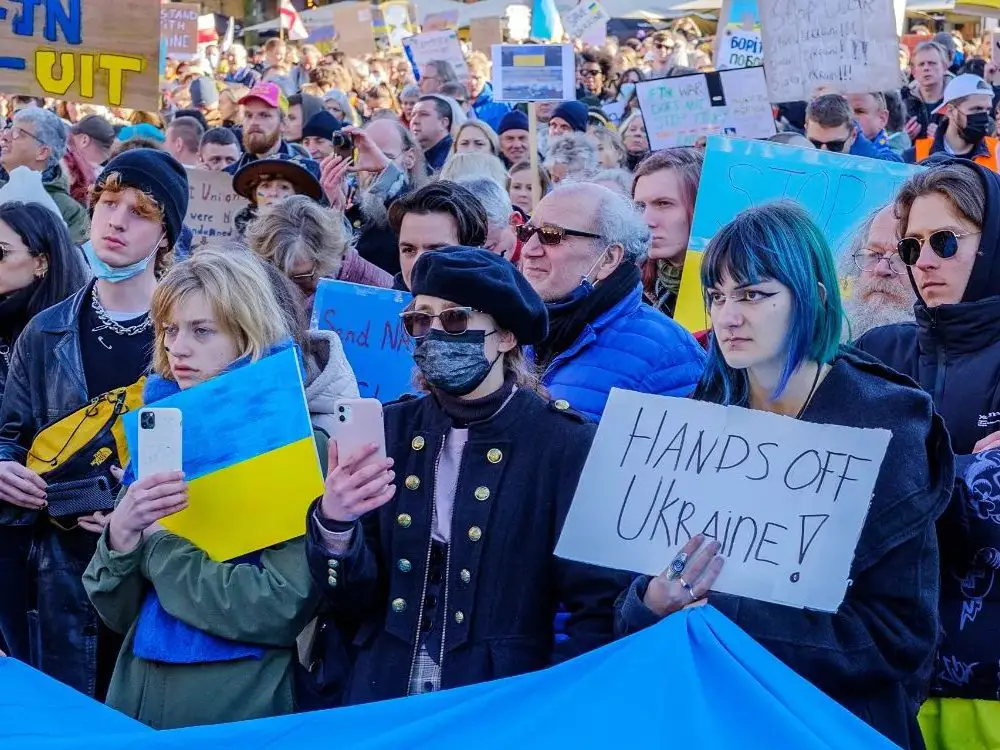Russia has officially declared war on Ukraine. On Feb. 24, Vladimir Putin announced a “special military operation” in Ukraine, and the internet was quick to react. In today’s age, the internet, dominated by millennials and Generation Z, plays a critical role in how people respond to current events. When tragedy strikes, people flock to the internet to express their emotions and gain information. Users are responding to Putin’s attacks in Ukraine with either satire or seriousness, but it can be difficult to distinguish when it comes to the internet. Some internet users have used their platforms to spread awareness of the attacks, while others use them for comedic purposes. For a serious matter such as this, the number of satirical comments and jokes is astounding.
Most internet users would say that the first time they heard of Putin’s invasion was either on TikTok or Twitter. Many first heard of the attacks on a TikTok news account called Bikini Bottom News, whose videos feature the talking fish reporter from the cartoon ”SpongeBob SquarePants.” Although it is not an official news account, it provides valid information for its viewers.
Other news reporters such as Matthew Cassel of VICE News provide more in-depth information for TikTok users. In a video on Cassel’s TikTok page, multiple people stack into the metro in Ukraine, fleeing just hours after Putin’s initial attack. He records as many families wait to depart west toward Poland.
@matthewcassel People fleeing Kyiv hours after #russia war on #ukraine begins
Twitter has been another way for news outlets to get the word out to the public. NBC News tweeted several photos and videos of the current situation in Ukraine. One particular photo shows a young couple holding their newborn in the basement of a perinatal center in Kyiv. People argue that posts like these are only there to tug on the heartstrings rather than provide valid information regarding Putin’s war, but they depict the harsh reality of the citizens of Ukraine.
Personal online accounts allow people to share their experiences and provide an outlet to express their emotions. Many Ukrainians have used social media to share their own stories and the effect of Putin’s recent attacks on their homes. Currently, no male Ukrainian is allowed to leave the country in case they need to be conscripted. Many TikTok and Twitter users have shared their experiences of leaving their families behind to escape the war. Katie Zylka shares a short video of her grandmother calling her friend’s home in Ukraine to say a final goodbye.
Another TikTok user, Vlasta, shares her experience as a Russian living in America while her Russian-Ukrainian mother is still in Russia. In one video, Vlasta expresses frustration over the countless questions from followers who want to know why she hasn’t talked about the situation between Russia and Ukraine. She then conveys her true feelings on the situation as well as how much it has personally affected her and her family. She further explains that she is in the final stage of her pregnancy and is sending all her savings to her mother — who is praying that she will live to see her granddaughter one day.
@thevlasta Not me or anyone wants this
Other videos have surfaced on Twitter as well. A video posted by @rblx_eddy shows a young Russian soldier who had surrendered and received food while on the phone with his family, saying, “This is not his war, it’s Putin’s.” These are real lives being affected by Putin’s selfish rage against Ukraine.
As people share their personal experiences with the situation in Ukraine, others have given their own controversial takes. Actress AnnaLynne McCord posted a video to her Twitter on Feb. 24 titled, “Dear Mister President Vladimir Putin.” In the video, McCord recites a poem she wrote directed toward Putin. In the poem, McCord articulates how she wishes she was his mother and could have taught him right from wrong in his youth so he wouldn’t feel the need to declare war in his adult years. Many Twitter users saw this video as offensive and as shifting blame to his mother rather than Putin. Users also attacked McCord for her tone-deaf video and posted parodies and memes in response.
Dear Mister President Vladimir Putin… pic.twitter.com/LbDFBHVWJf
— AnnaLynne McCord (@IAMannalynnemcc) February 24, 2022
Others have posted satirical videos of the situation in Ukraine. TikTok user Lil Gnar posted a video of himself casually riding a tank while the song “War” by Chief Keef plays in the background. Another TikTok video by @britishdose shows young British boys hopping around and getting pumped for a fight with the words “Live Footage: British Troops arrive in Ukraine” on the screen.
On Twitter, users have been sending tweets to Putin, some even referring to him as “daddy.” With few restrictions on who can message you on the internet, many people (including kids) have been sending messages to the Russian president. Before Russia invaded Ukraine, many Twitter users pleaded with him online in hopes he wouldn’t start a war. To little surprise, their attempts failed, and other users went after the trolls who thought these tweets to Putin were funny. Twitter user @zippidumbass tweeted, “where r all the bitches who posted the ‘omg putin daddy don’t do this this isn’t like you’ on insta and tiktok? real fuxking funny now huh.”
User @mnsknmoon tweeted, “if you still think making jokes about ww3 is cool, better look at this picture. look at my country. the photos were taken less than 24 hours ago. still funny, huh? still wanna call putin vladdy daddy and send him cute emoji? you’re disgusting,” followed by four pictures of a war-torn Ukraine. Since the attacks, there haven’t been many “Vladdy Daddy” tweets to Putin, and the internet is starting to take these events more seriously.
The situation between Russia and Ukraine is a serious matter that involves real lives. Some people may use the interest around the circumstances to make jokes therapeutically, but not all of this humor has good intentions. Jokes shouldn’t be made about a war where people’s lives, homes and families are in danger. It is important to remember that although Ukraine seems far away, it’s closer to home and the people around them than they may believe. With this in mind, internet users must show support to those in Ukraine and Russia during this difficult time.

















